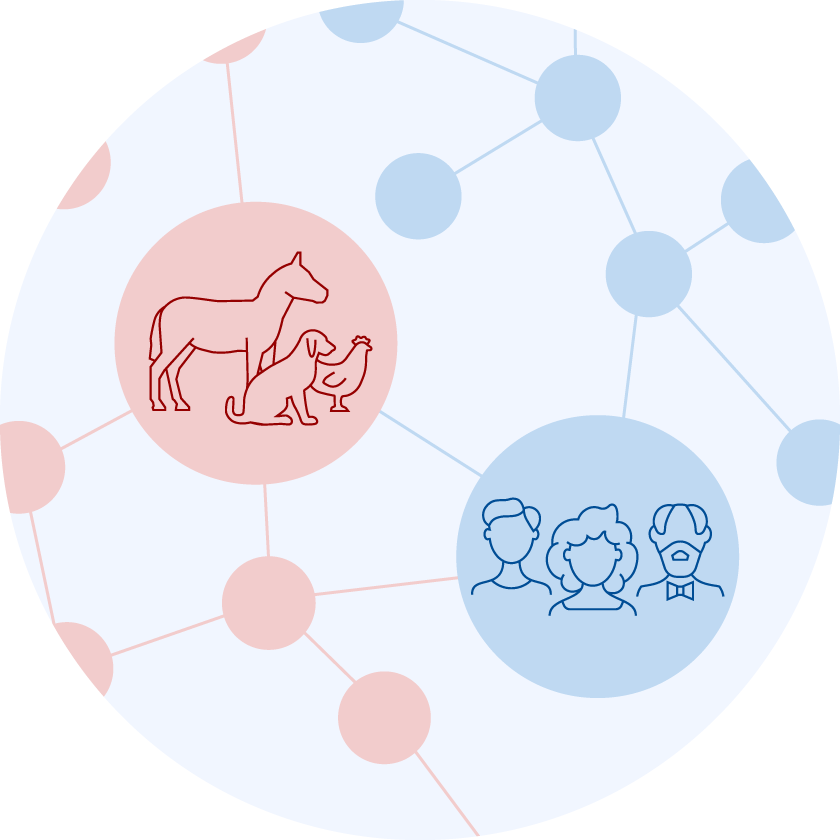
The benefits of shared research in human and animal health
We sat down with Clive Wood from Human Pharma and Eric Haaksma from Animal Health to discuss the advantages of working together
Read more
A long walk, a special treat or a good cuddle session — loving care is important for pets, especially as they grow older. Boehringer Ingelheim supports people in ensuring their pets’ health, with a broad portfolio of medicines and forward-looking research.
Cats and dogs are often considered important companions and, so, enjoy a correspondingly high standard of living — in prosperous countries, at least. That means these pets are with us longer than they used to be.
“There has been a huge increase in the life expectancy of pets in the past few years,” explains Erich Schött, Head of Pet Therapeutics and Pet Vaccines at Boehringer Ingelheim. House cats, for example, are now living twice as long as their feral cousins.
The trend, of course, means that caring for pets now goes beyond providing the nutrition and preventive healthcare that are responsible for that longevity. It means offering the care and disease management that elderly cats and dogs are likely to require.
What people may not realize when they decide to take in a pet is that the animal’s needs change with age. With a longer life expectancy, pets can experience similar age-related ailments that humans do — including heart, kidney and liver disease, diabetes, high blood pressure, arthritis and cancer.
Many of these diseases are treatable, and the same principle applies as for humans — the earlier the diagnosis occurs and treatment begins, the better the outlook. Take diabetes as an example: With the help of a healthy diet and the right medication, blood sugar levels normalize, the symptoms associated with the disease improve, and the pet’s quality of life increases significantly.
Veterinarians, of course, play a key role in the health of aging pets — and not just when problems arise. It’s the veterinarian’s job to make pet owners aware of potential health concerns in advance, to educate them and to advise them. Boehringer Ingelheim works closely with veterinarians in the areas of prevention, diagnosis and treatment of diseases.
The right treatment can significantly improve the wellbeing of aged pets — and thus that of their owners, as Mr. Schött can attest. “Our cat is 12 years old and has chronic kidney failure,” Mr. Schött said. “We were very worried about her. But with the right therapeutic measures, she turned back into her old self. She’s even successfully hunting mice again!”
Call us to hear
our story
Heart disease and its treatment can be similar in both humans and animals. Learn More.
Heart disease, diabetes, chronic kidney disease, atopic dermatitis and cancer are some of the illnesses that Mr. Schött’s colleagues in Animal Health Global Innovation have been focusing on, in search of innovative therapies. They work closely with internal teams including Boehringer Ingelheim’s Human Pharma department, as well as external partners, striving to address unmet medical needs.
One focus area of the exploratory research is cancer, which remains a devastating diagnosis. Though progress has been made, veterinarians often have only a few options for therapies — which is why Boehringer Ingelheim aims to make a real difference in the treatment of cancer in pets.
Gaining outside expertise can accelerate this work.
“We have already used innovative solutions and approaches to change the lives of many pets and people for the better. Now, we are looking forward to continuing that path and achieving much more.”Erich Schött,
Head of Pet Therapeutics and Pet Vaccines at Boehringer Ingelheim
In 2020, Boehringer Ingelheim acquired a trailblazing company: Global Stem Cell Technology, now known as Boehringer Ingelheim Veterinary Medicine Belgium. The unit is researching therapies based on mesenchymal stem cells, which have the potential to fight a variety of inflammatory and autoimmune diseases such as orthopedic problems. Other teams at Boehringer Ingelheim are exploring the potential to expand the use of stem cell treatments to other areas of disease.
Last year, Boehringer Ingelheim began a research collaboration with the biopharmaceutical company CarthroniX to work on new small molecules that might combat cancer in dogs.
Boehringer Ingelheim also collaborates with several other biopharmaceutical companies in the area of monoclonal therapeutic antibodies. Invetx, for example, is a Boston-based pioneer in therapies based on monoclonal antibodies for pet health. Monoclonal antibody therapies are a type of targeted immune treatment that mimics cells’ natural defenses. Already used to treat many different diseases in humans, monoclonal antibody science holds great potential for pet health care as well.
“We have already used innovative solutions and approaches to change the lives of many pets and people for the better,” Mr. Schött says, “and we want to continue to give pet owners even more years of quality time with their beloved animals.”